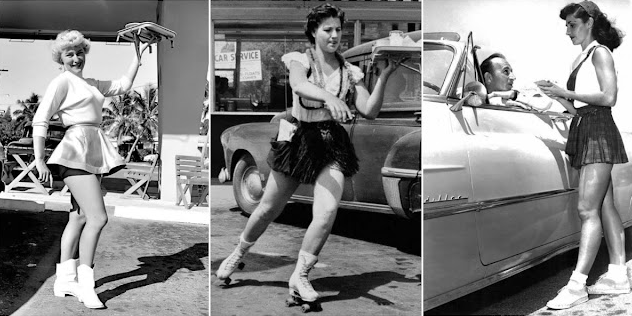Inter-Island Airways, the forerunner of the airline which is now known as Hawaiian Airlines, was incorporated on January 30, 1929. Hawaiian Airlines, Inc. is the largest airline in Hawaii. It is the 8th largest commercial airline in the US, and is based in Honolulu, Hawaii.
.jpg) |
| 1943. The airline hired its first hostesses to work on their 24-seat DC-3 aircraft. The uniform had a gray jacket and matching skirt with a white blouse; throughout the 40s additions such as a military cap and a black stripe on the sleeve were added. |
.jpg) |
| 1948. This photo was taken the first week of August 1948 when this group of Hawaiian Airlines hostesses greeted the Philippine Airline crew (represented by their lead hostess wearing the lei). That flight stopped over in Honolulu en-route to San Francisco, carrying President Elpiidio Quirino on a diplomatic mission to the United States. |
.jpg) |
| 1959. The pilots' uniforms look a little like doormen's next to the crisply tailored flight attendants' suits. This crew stands in front of a DC-6, used for trans-Pacific charter flights to Honolulu and Hilo, and for inter-island flights in the busy summer season, from 1958 to 1966. |
.jpg) |
| 1960. When the first commercial jet service between Los Angeles and Honolulu began in 1960, the uniform color changed from gray to blue. The jacket sleeves were shortened to three-quarters, and matching colored berets were added, along with a set of wings. |
.jpg) |
| 1966. Hawaiian Airlines rolled out new uniforms for its flight attendants in conjunction with the unveiling of the new DC-9 Royal Fan Jet service it added to its fleet. The uniforms were considered high fashion and featured a gorgeous three-piece ensemble topped by a white straw beret. They were designed and produced by Fashions by Hino, one of Hawaii's leading dress manufacturers at the time. |
.jpg) |
| 1968. "Flower Power" was the key to Hawaiian Airlines' Fashion Flight Attendant Plan for 1968, according to then president John H. Magoon, Jr. Attendants wore an A-line dress in a print designed specifically for Hawaiian Airlines by Tiger Fabrics of New York (they were produced by Kahala Sportswear of Honolulu). Flight attendants had the option of wearing the dress with either a short split sleeve or sleeveless. Fresh plumeria flowers were worn in the hair as part of the ensemble. Pale yellow tights accented the ensemble. David Evins of the renowned Evins Shoe Company of New York designed the shoes. The yellow leather purse was designed by New York fashion house, Park Lane. |
.jpg) |
| 1971. Now the uniform featured a two-piece outfit consisting of a nylon dress and jacket designed by Richard Tam of San Francisco, whose line could be found at high-end department stores. Hawaiian Airlines designed the print for the fabric. The accessories included low-heeled pumps, lace boots and sandals, which were all white. Scarves were used as headgear or sash belt or ascot tie. There was also a golden pendant worn on a chain around the neck, which was a stylized fish to represent the Hawaiian's conquest of the seas (and is a symbol of strength and good luck in Asian culture). |
.jpg)



